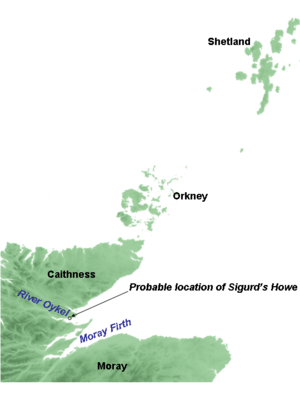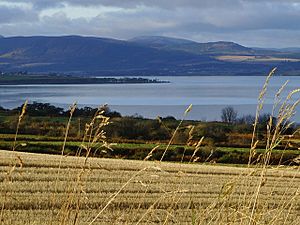Máel Brigte of Moray facts for kids

Máel Brigte was a powerful leader from the Pictish people in the 800s. He was also known as Máel Brigte the Bucktoothed or Máel Brigte Tusk because of a noticeable tooth. He was likely a mormaer of Moray, which was a type of regional ruler or earl. Máel Brigte is famous for a very unusual event that happened after his death. He was involved in the death of Earl Sigurd the Mighty of Orkney, even though Máel Brigte was already dead!
Contents
How Did Máel Brigte Die?
A Battle with Sigurd the Mighty
We don't know much about Máel Brigte's life. However, the story of his death is written in an old Viking tale called the Orkneyinga Saga. This story says that Máel Brigte and Sigurd the Mighty had disagreements. Sigurd challenged Máel Brigte to a battle. Each side was supposed to bring 40 men.
But Sigurd was sneaky. He brought 80 men to the fight instead of 40. Máel Brigte realized he had been tricked. He saw that each of Sigurd's horses had two sets of legs on its sides. This meant two men were riding each horse! Máel Brigte told his men to fight bravely. He urged them to "kill at least one man before we die ourselves." A fierce battle followed, but Máel Brigte and his men were defeated. Máel Brigte was killed in the fight.
The Strange Death of Sigurd
After winning the battle, Sigurd wanted to show off his victory. He had the heads of his defeated enemies tied to his men's saddles. This was a common practice at the time. As Sigurd rode home, something strange happened. Máel Brigte's buck-tooth, which was still attached to his head, scratched Sigurd's leg.
The scratch became infected. It got worse and worse. Because of this infection, Sigurd the Mighty eventually died. It was a very unusual way for a powerful earl to meet his end!
What is Máel Brigte's Legacy?
Where Did the Battle Happen?
The exact place where Máel Brigte and Sigurd fought is not known for sure. The Orkneyinga Saga says that Earl Sigurd built a fort in the southern part of Moray. Moray was a much bigger area back then than it is today. The saga also states that Sigurd was buried in a mound near the River Oykel.
Máel Brigte's main area of power was probably near what is now Inverness. In the 1200s, a farm near Dornoch was called "Syvardhoch." This name means "Sigurd's mound." Today, that farm is called Cyderhall. This suggests that the battle might have taken place in Easter Ross, somewhere between Inverness and Dornoch.
When Did These Events Occur?
The Orkneyinga Saga was written down around the year 1200. This was about 300 years after the events it describes about Máel Brigte and Sigurd. So, it doesn't give exact dates. However, historians believe that Sigurd Eysteinsson, also known as "the Mighty," ruled from about 875 to 892. This means Máel Brigte's death likely happened in the late 800s.
There are no other records that tell us about Máel Brigte's life. However, another person with the same name is mentioned later, in the mid-1000s. That Máel Brigte was the father of a ruler named Máel Coluim of Moray.
 | Emma Amos |
 | Edward Mitchell Bannister |
 | Larry D. Alexander |
 | Ernie Barnes |


